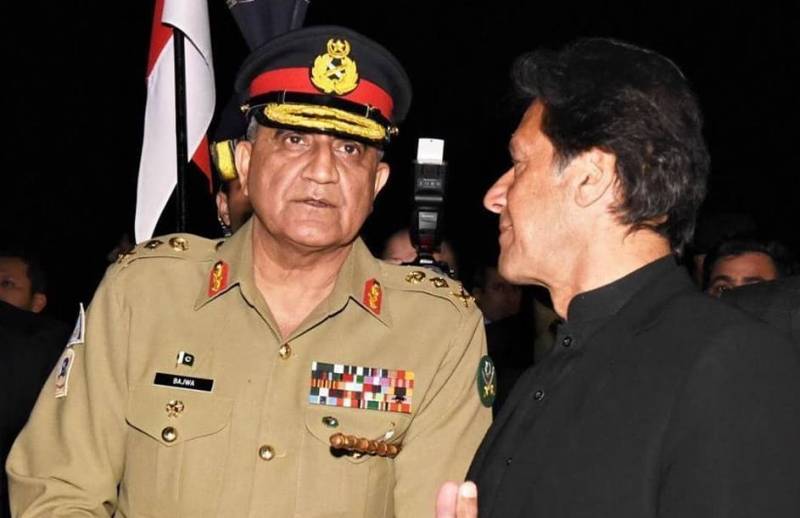PM’s assertiveness leads to speculations about civil-military ties

Stay tuned with 24 News HD Android App

Army Chief General Qamar Javed Bajwa wanted Lt Gen Nadeem Ahmed Anjum to see as the director-general of the Inter-Services Intelligence (ISI). Prime Minister Imran Khan approved him for the coveted post – but some three weeks after the ISPR had issued a press release on the subject.
Lt Gen Nadeem will take over on November 20.
During the period between October 6 (when the ISPR issued the press release and October 26 when the approval was accorded by the prime minister), the matter has been a subject of discussions at various forums. Opposition parties were ecstatic that their opponent – prime minister – had shot himself in the foot by delaying the matter for so long. In their assessment, the prime minister’s assertiveness on the subject has annoyed the all-powerful institution.
After the issuance of the notification on Tuesday (October 26) a new guessing game will start and people will meticulously monitor the civil-military relations to assess the limits set for the prime minister and the army chief on this important issue.
Many journalists claim that the damage to civil-military relations has already been done.
The defence ministry’s summary containing the names of those capable of being appointed as director-general of the Inter-Services Intelligence had landed at the prime minister’s house on October 18.
Before this, the ISPR had issued a news release on October 6 about the postings and transfers of three-star generals, including the new head of the spy agency.
Since proper procedure had not been followed by the military leadership for the appointment of spymaster, the prime minister did not sign the summary.
It is said that the army chief took up the matter on various occasions. However, the prime minister kept delaying it on one pretext or the other.
On his return from Saudi Arabia on Tuesday (October 26), the premier held an hours-long meeting with Gen Bajwa, after which the much-awaited notification for the appointment of Lt Gen Nadeem Ahmed Anjum as new ISI chief has been issued. The new ISI chief will take over on November 20, i.e some six weeks after the ISPR’s press release.
It is said that the player-turned-politician has tried to make it clear to everyone that as the country’s chief executive it was for him to choose the man for the post.
Most people believe that the prime minister’s attitude has created a gulf between him and the army leadership. However, important ministers have consistently been claiming that the premier and the army chief are on the same page and that harmonious relations between the two were never seen in the past by the holders of two powerful offices.
The delay of three weeks by the prime minister was not justified. The delay has sent a wrong signal to the military establishment. And this will not be in the government’s interest.
The prime minister must know that taming the lion is not an easy task. Likewise, Rome was not built in a single day.
That the military establishment sent a summary to satisfy a demand coming from the prime minister is like implementing his order in letter and spirit. Imran Khan should have reciprocated in the same spirit.
Now the situation has started changing. Opposition parties that looked dormant until a few days ago and were not in a position to create any challenge for the government, have launched a protest campaign. Even the PPP and ANP, that had parted ways with the PDM long ago, have started protests against the government.
The Jamaat-i-Islami, which is keeping itself away from all opposition parties because of differences with them, is also raising its voice against the PTI government.
The PML-N and PPP are, apparently, getting closer forgetting their past differences. PML-N President Shehbaz Sharif has congratulated PPP leader Khursheed Shah on his release after two years in prison on charges the NAB could not prove. The gesture is aimed to win the heart of the PPP leadership.
The Supreme Court has ordered an investigation to identify factors because of which the Punjab government did not restore the local governments despite the apex court’s order issued many months ago.
A strategy to oust the Punjab chief minister through a no-confidence motion is being worked out by the two major opposition parties.
All these developments should open the eyes of Prime Minister Imran Khan.
The situation would not have taken such a rapid turn if he had engaged the opposition, discussed with them the serious most problems facing the country and charted a course to solve them. Dialogue with them from the position of strength would have been helpful to the PTI.
The rapid change in the situation reminds one of the famous saying that the only thing predictable about Pakistan’s politics is that it is not predictable.
